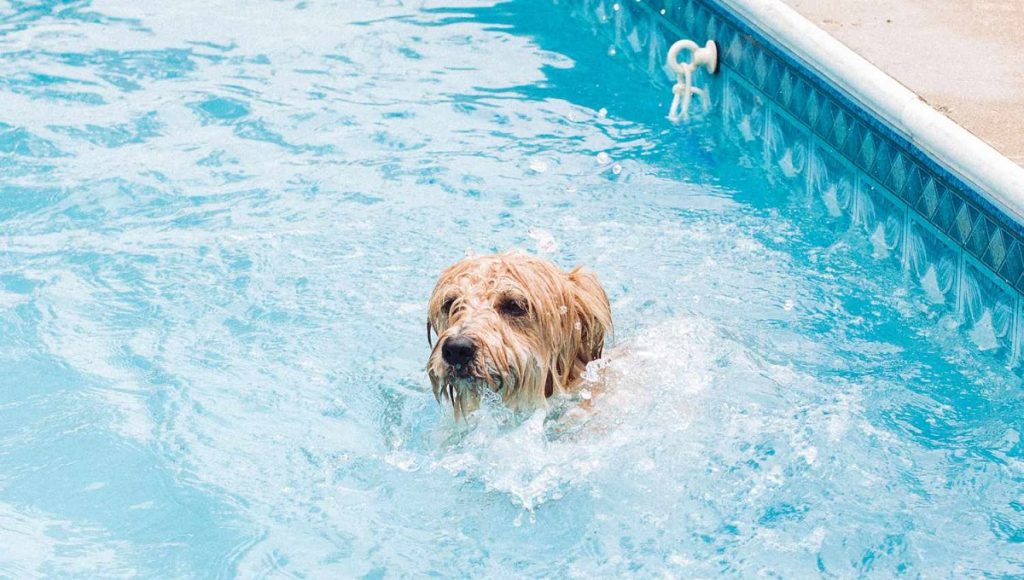Chlorine in high concentrations is harmful to dogs. Direct exposure can lead to irritation and discomfort. Ensuring your pet’s safety around household chemicals and swimming areas is crucial for any dog owner.
Chlorine, commonly used in pool water and cleaning products, poses a significant risk to dogs if they come into contact with it in large amounts.
A dog’s skin, eyes, and digestive system can become irritated from too much chlorine. It’s not only about avoiding concentrated forms; even chlorinated pool water should be a concern if your furry friend loves to swim.
A well-informed owner can easily manage these risks with the right precautions, maintaining a fun and safe environment for their pets. Keep reading to understand the impact of chlorine on your canine companions and how to prevent any potential harm.

The Effects Of Chlorine On Dogs
Many pet parents enjoy taking a refreshing dip with their furry companions. But, is chlorine from swimming pools safe for dogs? Understanding the effects of chlorine can help ensure a fun and safe swim for your four-legged friends.
Chlorine In Swimming Pools
Pools are popular spots for summer fun and exercise. Chlorine keeps water clean by killing bacteria and germs. This chemical can affect dogs differently than humans.
- Skin irritation: Dogs might scratch more after swimming.
- Eye redness: Chlorine can cause discomfort and redness in eyes.
- Coat dullness: Chemicals may strip natural oils, dulling a dog’s shiny coat.
Ingestion Of Chlorine
Dogs often swallow water while swimming. Small amounts might not cause harm, but more can be concerning. Signs of trouble include:
| Symptom | What to Watch For |
|---|---|
| Vomiting | An upset stomach or heaving |
| Diarrhea | Loose or watery stools |
| Drooling | Excessive salivation |
If these signs appear, contact a vet promptly.
Inhalation Of Chlorine Fumes
Dogs can inhale chlorine fumes near pools or cleaning supplies. Sensitive noses might react strongly. Be alert for:
- Coughing or wheezing
- Difficulty breathing
- Discomfort near the nose or throat
Move to fresh air and seek veterinarian advice if needed.
Symptoms Of Chlorine Exposure In Dogs
Dogs love to swim, yet chlorine in pools can pose health risks. Chlorine can be harmful if ingested or if it comes into contact with your dog’s skin or fur. Recognize the symptoms early to protect your furry friend.
Skin Irritation
Chlorine can dry out and irritate your dog’s skin. After swimming in a chlorinated pool, watch for these signs:
- Red, itchy skin
- Flaking or dandruff
- Bald spots or hair loss
- Excessive scratching
A quick rinse after pool time helps remove chlorine. This may prevent skin problems.
Respiratory Distress
Inhaling chlorine fumes can affect your dog’s breathing. Noticable symptoms include:
- Coughing or gagging
- Wheezing
- Rapid breathing
- Nasal discharge
Keep your dog away from strong chlorine odors. Fresh air and water help with recovery.
Preventing Chlorine Exposure In Dogs
Keeping your furry friend safe around swimming pools means preventing chlorine exposure. Chlorine can irritate a dog’s skin, eyes, and coat. Follow these guidelines to ensure your dog’s health and happiness:
Rinsing After Swimming
Dogs love to splash and play in the water, but pool chemicals can cling to their fur. To minimize risks, always rinse your dog with fresh water after a swim.
Use a hose or buckets to thoroughly wash away chlorine. This simple step helps prevent dry skin and discomfort.
Monitoring Pool Access
Chlorine levels in pools can vary, and not all dogs know their limits around water. Limit access to the pool area with fences or covers when unsupervised.
This keeps your dog safe from accidental ingestion of pool water. Consider swimming times under supervision to maintain control over their chlorine exposure.
Alternatives To Chlorine For Dog-friendly Swimming
Chlorine in pools could harm dogs. Dogs may swallow water during a swim, which risks their health. Long exposure irritates their skin and eyes. It’s vital to find dog-safe swimming options.
Saltwater Pools
Saltwater pools are safer for dogs. They use salt to clean water instead of chlorine. These pools are gentler on a dog’s skin and eyes.
Moreover, the salt levels are low, like natural body fluids. Dogs find these pools more comfortable for swimming.
- Less skin and eye irritation
- Safe water ingestion in small amounts
- Mimics natural saline conditions
Natural Swimming Ponds
Natural swimming ponds offer a chemical-free option for dogs. These ponds mimic natural water bodies. They are counted on plants and microorganisms to clean the water.
Dogs can play and swim without health risks. Benefits of natural ponds:
- Complete chemical-free experience
- Natural water purification process
- Helps dogs stay cool and have fun
Conclusion
Chlorine, in moderation, is generally not harmful to dogs. Yet, high exposure can lead to problems. Always rinse your pet after swimming and ensure fresh drinking water is available.